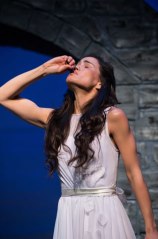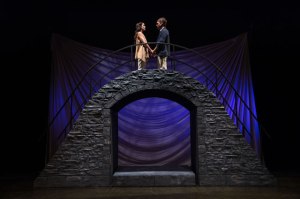
Melisa Pereyra as Juliet, Shakespeare-in-the-Schools production of Romeo and Juliet (Photo by Karl Hugh)
By Ashton Hall
William Shakespeare’s “Romeo and Juliet” came to life on stage when The Utah Shakespeare Festival’s yearly Shakespeare-in-the-Schools circuit stopped by the College of Southern Nevada’s Nicholas J. Horn Theatre for a 12-day stay in February.
With 16 roles, eight actors, and a three-month touring period, they will perform 70 shows and hit 150 schools. This gives students a chance to interact with the actors and develop a better understanding of Shakespearean text.
The 75-minute version of Shakespeare’s “Romeo and Juliet,” while alarmingly condensed, was nothing short of captivating. Laden with love for the craft, the actors delivered every line as if the words were their own.
Melisa Pereyra, who played Juliet, explained that putting yourself in the shoes of the characters while portraying them on stage requires a close relationship with them on paper.
“If you’re paying attention to the text, which you should always do, and you’re listening to what the other person is saying, it really is inevitable and easy,” Pereyra said.
Josh Innerst who was cast in the role of both Friar and Tybalt recalls seeing his first theatrical adaptation of Shakespeare’s work. “I was in the sixth grade and I saw a production of “Hamlet” that just blew me away as a kid, and I’m sure I didn’t understand what every single word meant … but I knew exactly what was going on.”
It is Shakespeare’s approach to language which makes the task of understanding the text daunting. Pereyra recounts learning the classical text, “I think Shakespeare is terrifying,” she said.
Pereyra sees the complexity of speaking the text as game that she must defeat. “If I can do that, I can do anything else,” she said.
“In Shakespeare’s time they were doing it in their own contemporary clothing, and I feel like nowadays you want it to be relatable and contemporary,” said Chris Klopatek, who played Romeo. The contemporary clothing worn during the play is another way to bridge the gap between Shakespeare and today’s youth. By wearing present-day clothing, the actors are taking a new approach, which caters to today’s generation.
While visiting different schools and conversing with large numbers of people, student questions regarding the use of language range from insightful to commonplace. “I think it’s a really hit or miss thing,” Innerest said in regard to the quality of questions asked.
“Some schools we’ll go into have a great teacher who has taken the time to not intimidate the students with Shakespeare, but educate them with it.”
Klopatek notes that some can be caught up in the more rigid facets of the text.
“Teachers sort of hone in on the technical aspects of the verse and the meter … which makes it kind of bookish, in a way,” Klopatek said. “Rather than acting it out and seeing how it would be preformed, which is what it’s meant to be.”




